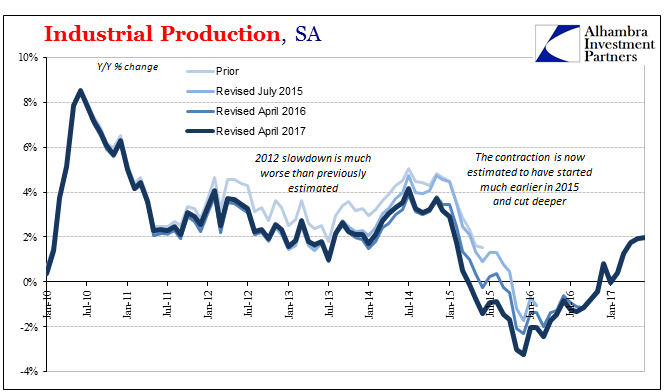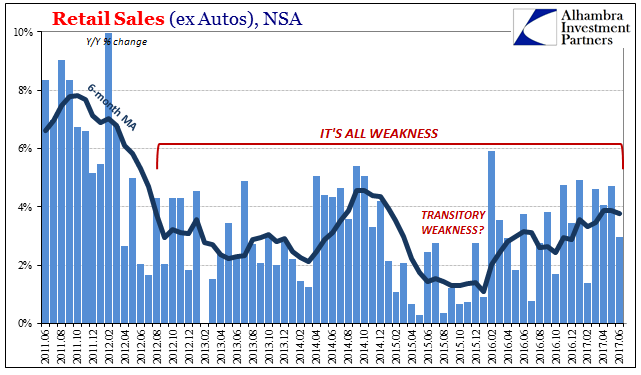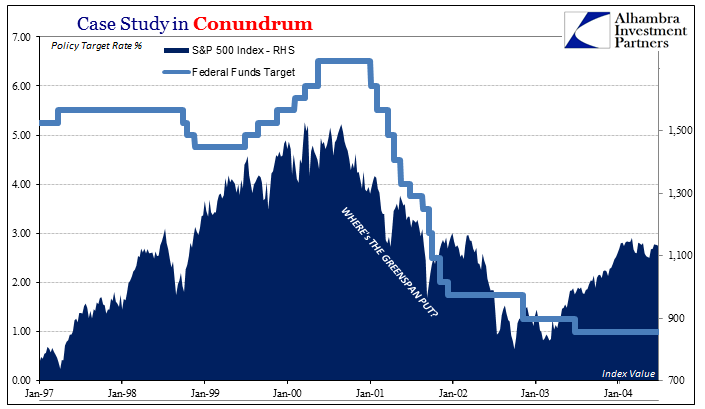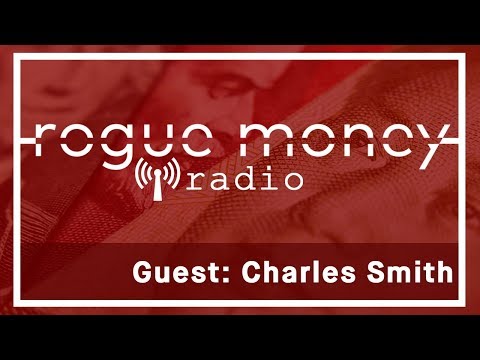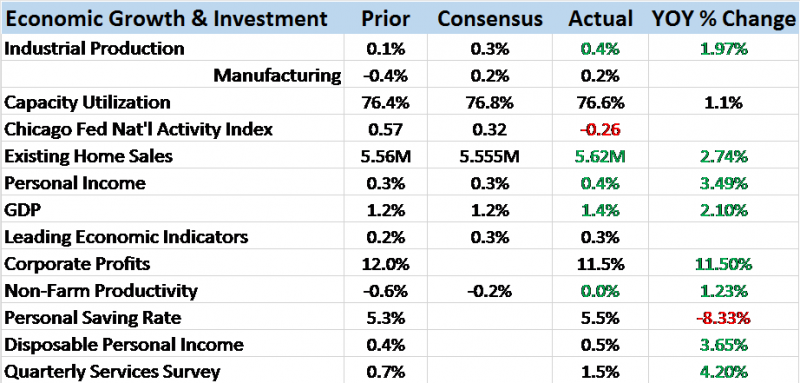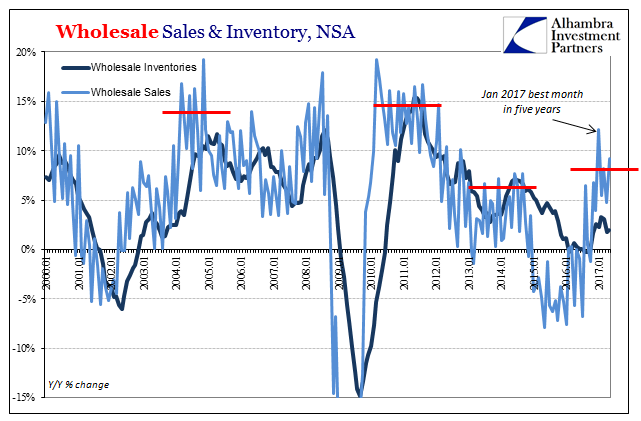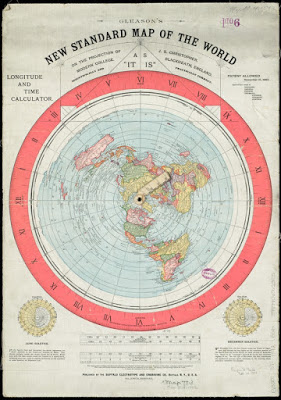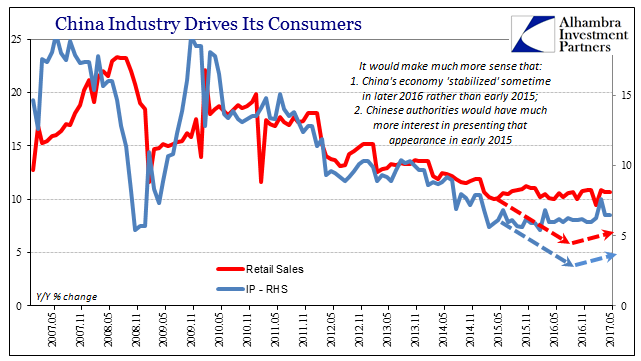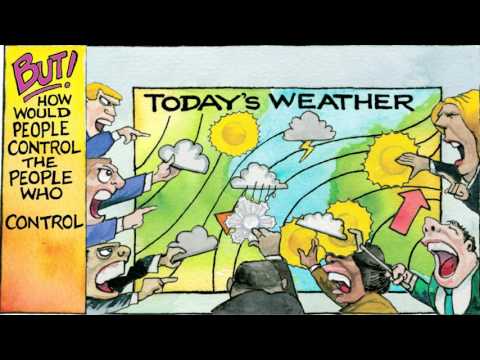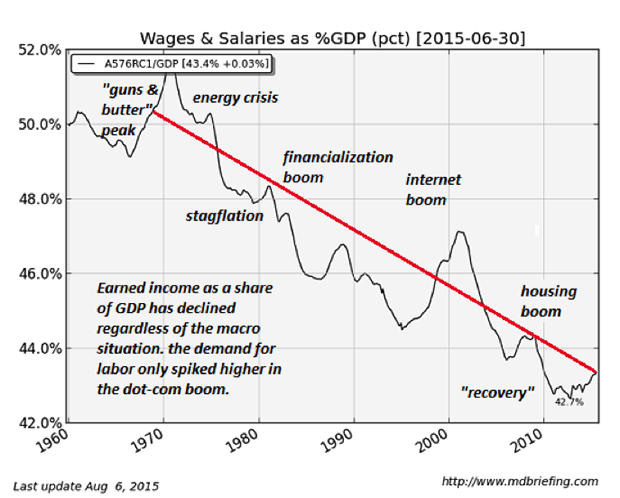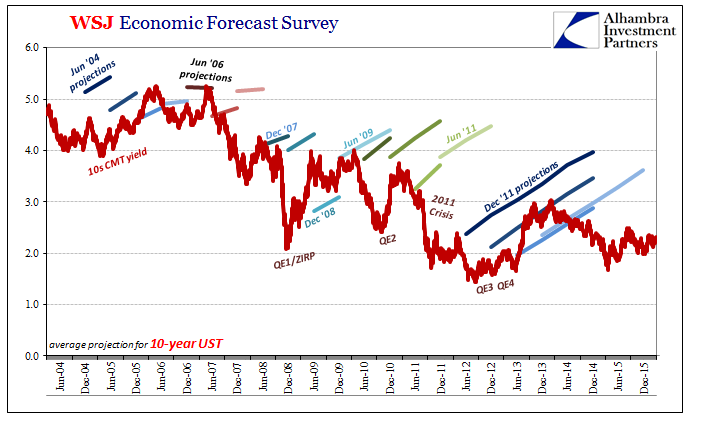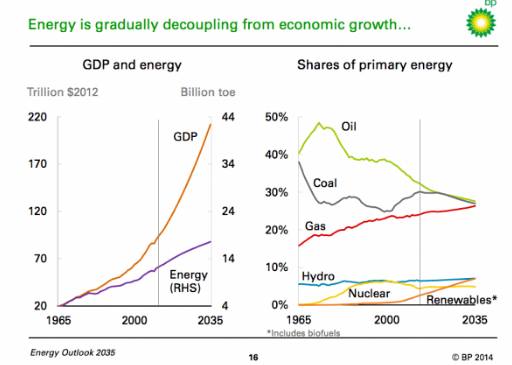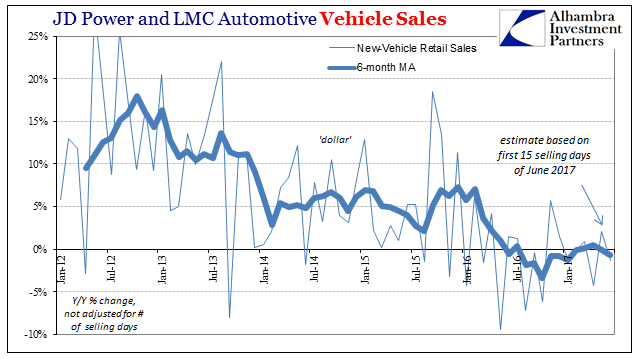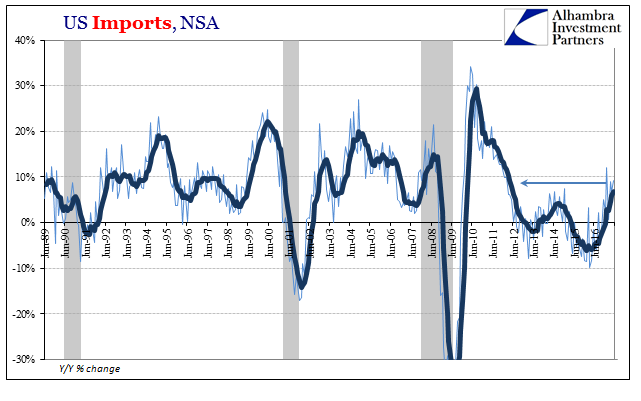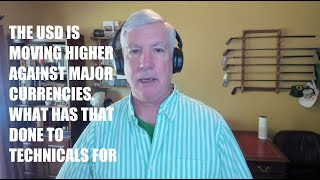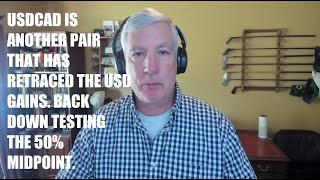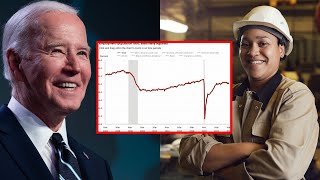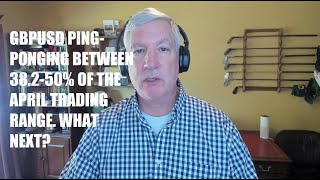Category Archive: 5) Global Macro

U.S. Industrial Production: Industrial Drag
Completing a busy day of US economic data, Industrial Production was, like retail sales and inflation data, highly disappointing. Prior months were revised slightly lower, leaving IP year-over-year up just 2% in June 2017 (estimates for May were initially 2.2%). Revisions included, the annual growth rate has been stuck around 2% now for three months in a row, suggesting like those other accounts a pause or even possible end to the mini-improvement...
Read More »
Read More »
Retail Sales Conundrum
Retail sales were thoroughly disappointing in June. Whereas other accounts such as imports or durable goods had at least delivered a split decision between adjusted and unadjusted versions, for retail sales both views of them were ugly. Seasonally-adjusted first, spending last month was down for the second straight time. Worse than that, estimated sales were just barely more than in January.
Read More »
Read More »
Why is sand in short supply? | The Economist
The world uses 40 billion tonnes of sand each year to build cities and towns, but global reserves are running low. We find out why. Click here to subscribe to The Economist on YouTube: http://econ.trib.al/rWl91R7 Sand is crucial for construction. Much of the global economy relies on it. We use 40 billion tonnes of it … Continue...
Read More »
Read More »
US S&P 500 Index, Federal Funds Target, Manufacturing Payrolls, US Imports and US Banking Data: All Conundrums Matter
Since we are this week hypocritically obsessing over monetary policy, particularly the federal funds rate end of it, it’s as good a time as any to review the full history of 21st century “conundrum.” Janet Yellen’s Fed has run itself afoul of the bond market, just as Alan Greenspan’s Fed did in the middle 2000’s.
Read More »
Read More »
Global Asset Allocation Update: Not Yet
There is no change to the risk budget this month. For the moderate risk investor, the allocation between risk assets and bonds is unchanged at 50/50. There are no changes to the portfolio this month. Growth and inflation expectations rose somewhat since last month’s update. The change is minor though and within the range of what we’ve seen in recent months.
Read More »
Read More »
RMR: Exclusive Interview with Charles Hugh Smith (07/17/2017)
Charles shares his great insights regarding how the financial elites have destroyed the real economy, asks if the political parties are outdated and explains what the petrodollar really is. We are political scientists, editorial engineers, and radio show developers drawn together by a shared vision of bringing Alternative news through digital mediums that evangelize our …
Read More »
Read More »
Bi-Weekly Economic Review: Attention Shoppers
The majority of the economic reports over the last two weeks have been disappointing, less than the consensus expectations. The minor rebound in activity we’ve been tracking since last summer appears to have stalled. Retail sales continue to disappoint and inventory/sales ratios are once again rising – from already elevated levels.
Read More »
Read More »
Emerging Markets: Preview of the Week Ahead
Emerging Markets FX ended the week on a firm note, helped by softer than expected US data. Indeed, EM FX was up across the board for the entire week and was led by BRL, MXN, and ZAR. The ECB meeting this week will draw some interest, especially after the BOC last week became the second major central bank to hike rates.
Read More »
Read More »
Wholesale: No Acceleration, No Liquidation
In the same way as durable goods orders and US imports, wholesale sales in May 2017 were up somewhat unadjusted but down for the third straight month according the seasonally-adjusted series. As with those other two, the difference is one of timing. In other words, combining the two sets, seasonal and not, we are left to interpret a possible recent slowing in activity.
Read More »
Read More »
China Imports and Exports: The Ghost Recovery
To the naked eye, it represents progress. China has still an enormous rural population doing subsistence level farming. As the nation grows economically, such a way of life is an inherent drag, an anchor on aggregate efficiency Chinese officials would rather not put up with.
Read More »
Read More »
Emerging Markets: What has Changed
Pakistani Prime Minister Nawaz Sharif may face trial on corruption charges. Turkey will reportedly pay $2.5 bln for a Russian missile defense system. Nigeria said it was willing to cap its oil production to support OPEC efforts to cut global supply. Former Brazilian President Lula was sentenced to nine and half years in prison on corruption charges. S&P downgraded Chile one notch to A+ with a stable outlook.
Read More »
Read More »
Competing CPI,PPI, Industrial Production and Retail Sales: No Luck China, Either
Former IMF chief economist Ken Rogoff warned today on CNBC that he was concerned about China. Specifically, he worried that country might “export a recession” to the rest of Asia if not the rest of the world. I’m not sure if he has been paying attention or not, but the Chinese economy since 2012 has been doing just that to varying degrees often just shy of that level.
Read More »
Read More »
The World If…humans could control weather | The Economist
What if people could control the weather? It wouldn’t be all sunshine and blue skies—there would likely be much disagreement. Click here to subscribe to The Economist on YouTube: http://econ.trib.al/rWl91R7 Daily Watch: mind-stretching short films throughout the working week. For more from Economist Films visit: http://films.economist.com/ Check out The Economist’s full video catalogue: http://econ.st/20IehQk Like …
Read More »
Read More »
The Inevitability Of DeGrowth
Debt-dependent consumption in a world in which wages stagnate for the bottom 90% and energy costs increase as demand outstrips supply is a system with only one possible end-point: collapse. Even though we don't know precisely how the future will unfold, we know a few things: Of the 7.5 billion humans on the planet, virtually every individual wants to enjoy a high-energy consumption “middle-class” lifestyle.
Read More »
Read More »
US Federal Funds, Bond Market and WSJ Economic Survey: The Hidden State of Money
Correctly interpreting the bond market is more than just how and when to invest your money in UST’s. Not that it isn’t useful in such a money management capacity, but interest rates starting at the risk-free tell us a lot about what is wholly unseen. There is simply no way to directly observe inside an economy what is taking place at all levels and in all transactions. We try to estimate as best we can in the aggregate, but the real economy works...
Read More »
Read More »
We Need a New American (Social) Revolution
The solution is a new decentralized way of living that bypasses the chokepoints of centralized political and financial power. I'm going to tell a story here using charts--a story that leads to one conclusion: we need a New American Social Revolution.
Read More »
Read More »
Vehicle Sales, Consumer Price Index and Average Weekly Hours: More Than Minor Auto Potential
According to Edmunds.com, in June 2017 the average length of a new vehicle loan has been stretched to a record 69.3 months. JD Power says that incentives last month were running at more than 10% of MSRP, the eleventh time over the past twelve months where manufacturers have so heavily discounted. And yet, the auto industry would have us believe that the problem is one of fleet sales rather than of consumers.
Read More »
Read More »
Which countries allow an option other than male or female on passports? | The Economist
Eight countries allow citizens to apply for a passport without choosing a specific gender. Can you guess which? Click here to subscribe to The Economist on YouTube: http://econ.trib.al/rWl91R7 Daily Watch: mind-stretching short films throughout the working week. For more from Economist Films visit: http://films.economist.com/ Check out The Economist’s full video catalogue: http://econ.st/20IehQk Like The Economist …
Read More »
Read More »
US Imports, Exports and Trade Stalls, Too
US imports rose year-over-year for the seventh straight month, but like factory orders and other economic statistics there is a growing sense that the rebound will not go further. The total import of goods was up 9.3% in May 2017 as compared to May 2016, but growth rates have over the past five months remained constrained to around that same level. It continues to be about half the rate we should expect given the preceding contraction.
Read More »
Read More »










